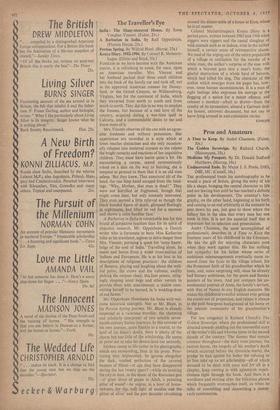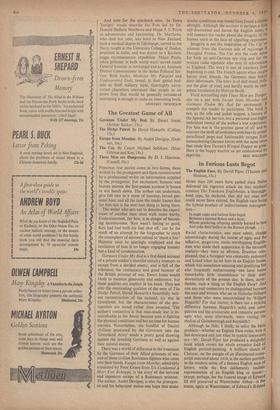Pros and Amateurs
Medicine My Passport. By Dr. Donald Stafford Matthews. (Harrap, 18s.) THE professional treats his autobiography as he would a piece of fiction, giving the story of his life a shape, bringing the central character to life and not leaving him until he has reached a definite point in his development. The amateur's bio- graphy, on the other hand, beginning at his birth and coming to an end arbitrarily at the moment he puts down his pen, just goes to show where the fallacy lies in the idea that every man has one book in him. It is not the material itself that is important but its selection and presentation.
Andre Chamson, the most accomplished of professionals, describes in A Time to Keep the fourteen years of his childhood in the Cevennes. He has the gift for enjoying characters even when they work against him. He has nothing but sympathy for his father whose series of ambitious mismanagements eventually mean re- moval from the /ycee to the village school, for the Protestant faith of his grandmother which he loses, and, more surprising still, since he already had literary ambitions, for the poets and Sunday painters of his town. And just compare his un- sentimental portrait of Anna, the family's servant, with that of Nanny in any English memoirs. He makes his childhood eventful without ever getting the events out of proportion, and relates it always to the petit bourgeois background of his home or the peasant community of his grandmother's village.
Far less congenial is Richard Church's The Golden Sovereign, where the professional skill is directed towards padding out the uneventful story of the writer's life and irksome times in the second decade of the century. The themes that remain constant throughout—the daily tram journey, the custom house, the tragedy of his mother's death (which occurred before the chronicle starts), the grudge he had against his father for refusing to let him take up an art scholarship —all of which demand to be dealt with once and for all in a chapter, keep coming in with spinsterish repeti- tiveness right through the book. And there is a wordiness and striving after the felicitous phrase which frequently overreaches itself, as when he talks of assembling and dissembling a motor- cycle combination.
And now for the one-book men. 'in Town Tonight' would describe the lives led by Dr. Donald Stafford Matthews and Major J. S. Poole as adventurous and fascinating. Dr. Matthews, who died last year, was born in New Zealand, took a medical degree in Edinburgh, served in the Navy, taught at the University College of lbadan, practised in India, and was doctor to a Kachen- junga reconnaissance expedition. Major Poole, taken prisoner in both world wars, served-under General Ironside in Archangel and as an Assistant District Commissioner in the Sudan PoliticarSer- vice. Both books, Medicine My Passport and Undiscovered Ends, reveal, in their genial bed- side or bluff military style, thoroughly extro- verted characters convinced that simply to set down lives that would be generally 'considered
• interesting is enough to make an interesting book.
GEOFFREY NICHOLSON























































 Previous page
Previous page